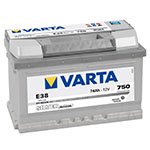Why can a “fresh” battery suddenly lose its charge?
Most car batteries among all commercial batteries are maintenance free. That is, the driver is sure that it is enough to just put the battery in and you can no longer pay attention to it. However, this is not entirely true, and when an expensive unattended power source suddenly fails or begins to quickly lose its charge, many blame the manufacturer or the store that slipped them low-quality goods.
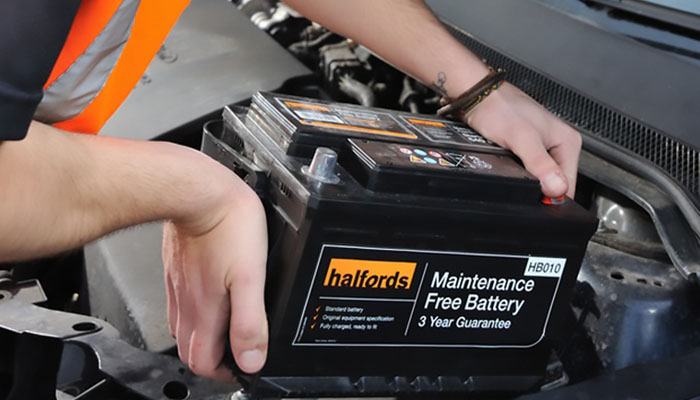
The truth is that the stability of the battery directly depends on its operating conditions. If the battery is installed correctly, it meets the requirements of the car manufacturer, the vehicle’s on-board power supply is operational and the owner monitors the battery condition, then such a battery can work for a very long time. However, there are several negative factors that during the operation of the car battery can adversely affect its operation. Let's look at the main reasons that can affect the accelerated wear and quick discharge of the battery.
Cleanliness is the key to long and proper operation of all car batteries
Often, drivers ignore this point, although maintaining cleanliness, regardless of whether the battery being serviced or maintenance-free, can significantly extend the battery life. That is why make sure that the battery cover is always clean and dry. Naturally, this rule is relevant only if the rules for timely recharging are followed and the vehicle’s onboard network is fully operational.
Why is cleanliness so important for batteries? Everyone understands that under the hood of a car there is always, albeit in a small amount, but still there are vapors of various technical fluids. These are most often particles of motor oil, fuel and other fuels and lubricants. Also, one should not forget that when driving on a wet and dirty road (this is typical for operation in the autumn-winter period), moisture, dirt and aggressive salt solutions, which public services water the roads, easily penetrate into the engine compartment. Gradually, all this settles and accumulates on the battery cover, forming a fairly dense oil film. This is what can cause serious problems, since this film conducts electricity and forms an additional track, connecting the plus and minus between each other.
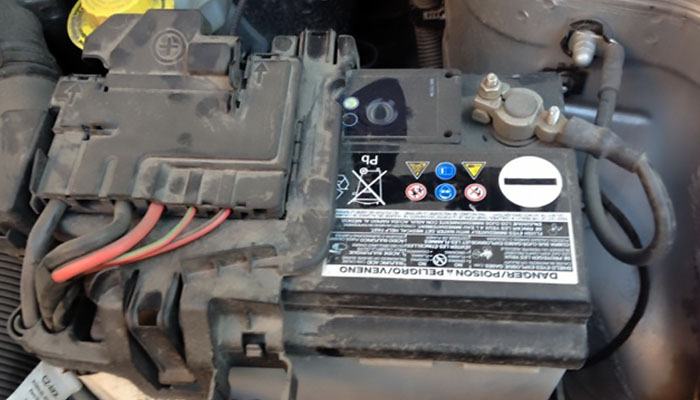
As a result, current leakage naturally begins. Moreover, the loss can be very noticeable and greatly exceed the standard battery self-discharge. What does this lead to? Naturally to accelerate the discharge of the battery. And after a long stay, the driver may suddenly find that the battery is discharged almost to zero and is not able to continue to perform its basic functions. Unpleasant situation, isn't it?
That is why when leaving the car in the garage or in the parking lot for a very long time (for example, going on vacation or a business trip), be sure to remove the negative terminal and carefully wipe the battery cover to remove all plaque and dirt from its surface. If there are no additional conductors, the battery will not lose its charge abruptly and quickly.
Dangerous effects of corrosion
In the places where the power wires are connected to the terminals of the car battery, often even after a short operation, plaque and rust can be noticed. If you find signs of corrosion, this cannot be ignored; special attention should be paid to such batteries. It is recommended that any corrosive deposits be removed from the contact surface as quickly as possible. This is due to the fact that such defects, even minor ones, lead to an additional leakage of current, a decrease in the starting capacity of the battery and an accelerated discharge.
Corrosion removal methods
You can remove traces of oxidation in different ways: just scraping off the plaque with a knife, a stiff brush, emery cloth, etc. For maximum effect, it is recommended to use a special solution with the addition of soda. The concentration of the solution should be approximately 10%. Add soda to warm water and carefully place.
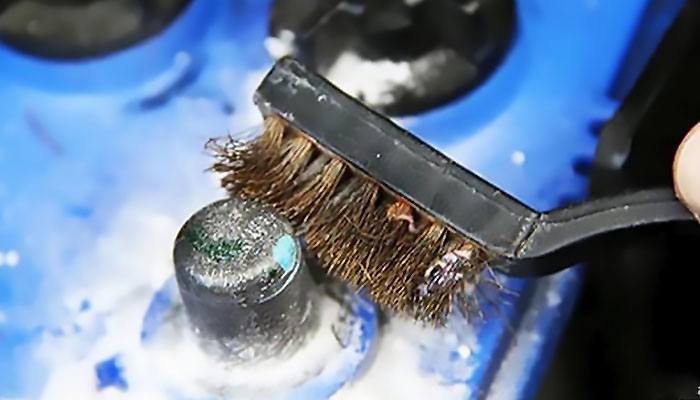
The cleaning procedure itself is quite simple, you need to take a brush or rags and moisten them abundantly in the solution to proceed with the removal of plaque from the terminals. At the same time, hissing or even boiling of the liquid can be observed, this is not scary, this is a completely normal reaction. It is recommended that you clean the remaining plaque with sandpaper.
Another popular option is to use special chemistry. In stores, you can find a large selection of special aerosols that remove dirt, corrosion products, etc. Typically, these substances have a complex effect on cleaned contacts. Sprays contain special reactants and synthetic oil, dielectric and anti-corrosion additives. This helps them quickly remove sulfide deposits, rust, dirt and even acid residues.
How to protect the battery terminals?
After the corrosion has been eliminated, it is very important to carry out a protective treatment of the battery terminals. This will help to avoid such problems in the future, extend the life of the battery and increase its efficiency. For this, you can also use special aerosols or lubricants. For example, Batterie-Pol-Fett by Liquid Moly.
If you don’t have special tools at hand, you can use special technical oil, solid oil or even regular petroleum jelly. In general, any greasy, oily, difficult to rinse compound is suitable for terminal protection.
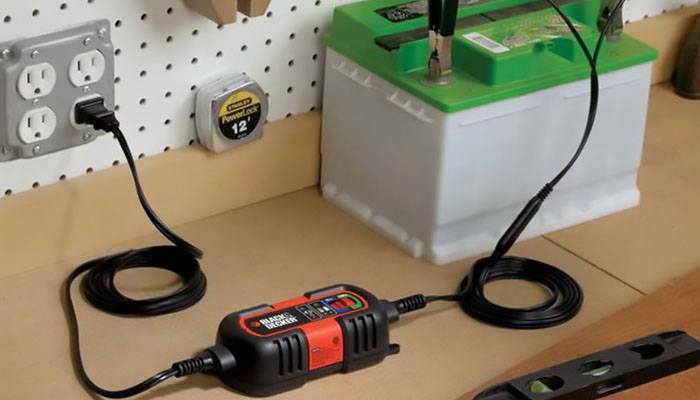
As you can see, there are very simple rules, the observance of which will help to avoid many of the troubles associated with the operation of car batteries. If you have already allowed the discharge of the battery, then after carrying out the necessary preventive measures, it must be fully charged. To do this, you can use special chargers. In the online store 130.com.ua you will find a large selection of chargers of various types and designs from leading manufacturers. Here you can buy a battery charger with an automatic mode of operation, with the function of desolation, diagnostics of the state of the battery, etc.
Related Content
Car batteries: Best Sellers

Stay tuned for updates!
Subscribe to our Telegram channel and be the first to receive useful materials.
Subscribe
























